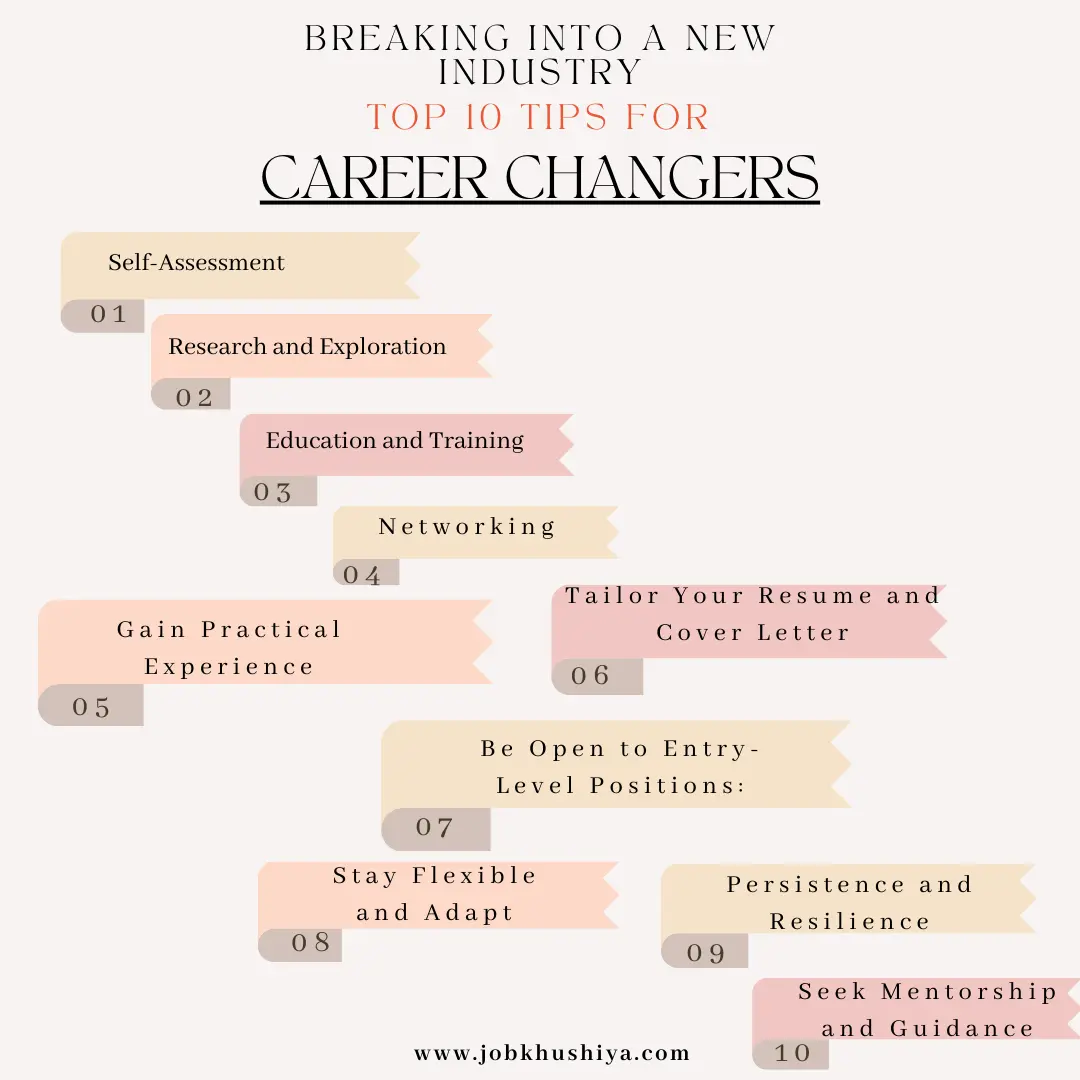In today’s fast-paced and ever-evolving job market, the concept of a lifelong career in a single industry is becoming increasingly rare. Many professionals find themselves contemplating a change in career path at some point in their lives, whether due to shifts in personal interests, industry trends, or economic factors. While embarking on a new career journey can be daunting, it is also an exciting opportunity for growth and self-discovery. For those considering breaking into a new industry, here are some valuable tips to help navigate the transition successfully.
Top 10 Tips for Career Changers:
- Self-Assessment: Before diving headfirst into a new industry, it is essential to conduct a thorough self-assessment. Reflect on your strengths, weaknesses, interests, and values. Consider what skills and experiences you can leverage from your current career and how they might translate to the new industry. Identifying your transferable skills will help you market yourself effectively to potential employers and make a smoother transition.
- Research and Exploration: Once you have identified potential industries of interest, take the time to research them thoroughly. Learn about industry trends, key players, and growth opportunities. Attend networking events, workshops, and conferences related to the industry to gain insights and make connections. Exploring the new industry firsthand will provide valuable knowledge and help you determine if it aligns with your career goals and aspirations.
- Education and Training: Depending on the requirements of the new industry, you may need to acquire additional education or training to enhance your skills and credibility. Consider enrolling in courses, workshops, or certification programs relevant to the industry or specific roles you are targeting. Investing in your professional development demonstrates your commitment to making a successful transition and equips you with the necessary tools to thrive in your new career.
- Networking: Building a strong professional network is crucial when breaking into a new industry. Reach out to professionals already working in the industry through LinkedIn, industry events, or mutual connections. Networking allows you to learn from others’ experiences, gain valuable advice, and uncover hidden job opportunities. Join industry-related groups and associations to expand your network further and stay updated on industry news and trends.
- Gain Practical Experience: One of the most effective ways to break into a new industry is by gaining practical experience through internships, volunteer work, or freelance projects. Even if these opportunities are unpaid or low-paying, they provide invaluable hands-on experience, help you build a portfolio, and demonstrate your commitment to the industry. Look for ways to showcase your skills and expertise through tangible results and accomplishments.
- Tailor Your Resume and Cover Letter: When applying for roles in a new industry, it is essential to tailor your resume and cover letter to highlight relevant skills and experiences. Focus on your transferable skills and how they align with the requirements of the new role or industry. Use keywords and phrases from the job description to ensure your application gets noticed by hiring managers and applicant tracking systems.
- Be Open to Entry-Level Positions: Breaking into a new industry often requires starting from the bottom and working your way up. Be open to accepting entry-level positions or roles that may not align perfectly with your previous experience. These positions serve as stepping stones to gaining valuable industry-specific skills and knowledge, as well as proving your dedication and commitment to your new career path.
- Stay Flexible and Adapt: Transitioning into a new industry is rarely a linear process, and it often involves setbacks and challenges along the way. Stay flexible and open-minded, and be prepared to adapt your approach as needed. Embrace learning opportunities and seek feedback from mentors and peers to continuously improve and grow in your new role.
- Persistence and Resilience: Breaking into a new industry requires persistence and resilience in the face of rejection and uncertainty. Stay focused on your long-term goals and remain optimistic, even when faced with setbacks. Celebrate your achievements and milestones along the way, no matter how small, and use them as motivation to keep pushing forward.
- Seek Mentorship and Guidance: Having a mentor or career coach can be invaluable when navigating a career transition. Seek out experienced professionals in your desired industry who can offer guidance, advice, and support as you navigate the challenges of breaking into a new field. Learn from their experiences and leverage their networks to accelerate your career growth.
In conclusion, breaking into a new industry can be a challenging yet rewarding endeavor for career changers. By conducting thorough self-assessment, researching the industry, investing in education and training, networking, gaining practical experience, and staying flexible and resilient, you can successfully navigate the transition and build a fulfilling career in your chosen field. Remember that every setback is an opportunity for growth, and with determination and perseverance, you can achieve your career aspirations in a new industry.
